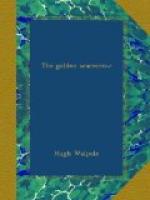Barbara Flint was a little girl, aged seven, who lived with her parents at No. 36 March Square. Her brother and sister, Master Anthony and Miss Misabel Flint, were years and years older, so you must understand that she led rather a solitary life. She was a child with very pale flaxen hair, very pale blue eyes, very pale cheeks—she looked like a china doll who had been left by a careless mistress out in the rain. She was a very sensitive child, cried at the least provocation, very affectionate, too, and ready to imagine that people didn’t like her.
Mr. Flint was a stout, elderly gentleman, whose favourite pursuit was to read the newspapers in his club, and to inveigh against the Liberals. He was pale and pasty, and suffered from indigestion. Mrs. Flint was tall, thin and severe, and a great helper at St. Matthew’s, the church round the corner. She gave up all her time to church work and the care of the poor, and it wasn’t her fault that the poor hated her. Between the Scylla of politics and the Charybdis of religion there was very little left for poor Barbara; she faded away under the care of an elderly governess who suffered from a perfect cascade of ill-fated love affairs; it seemed that gentlemen were always “playing with her feelings.” But in all probability a too vivid imagination led her astray in this matter; at any rate, she cried so often during Barbara’s lessons that the title of the lesson-book, “Reading without Tears,” was sadly belied. It might be expected that, under these unfavourable circumstances, Barbara was growing into a depressed and melancholy childhood.
Barbara, happily, was saved by her imagination. Surely nothing quite like Barbara’s imagination had ever been seen before, because it came to her, outside inheritance, outside environment, outside observation. She had it altogether, in spite of Flints past and present. But, perhaps, not altogether in spite of March Square. It would be difficult to say how deeply the fountain, the almond tree, the green, flat shining grass had stung her intuition; but stung it only, not created it—the thing was there from the beginning of all time. She talked, at first to nurses, servants, her mother, about the things that she knew; about her Friend who often came to see her, who was there so many times—there in the room with her when they couldn’t catch a glimpse of him; about the days and nights when she was away anywhere, up in the sky, out on the air, deep in the sea, about all the other experiences that she remembered but was now rapidly losing consciousness of. She talked, at first easily, naturally, and inviting, as it were, return confidences. Then, quite suddenly, she realised that she simply wasn’t believed, that she was considered a wicked little girl “for making things up so,” that there was no hope at all for her unless she abandoned her “lying ways.”




